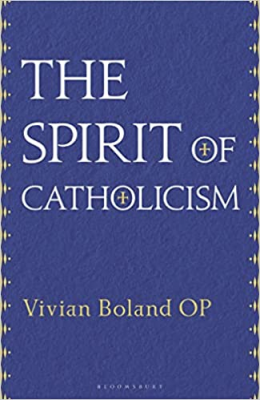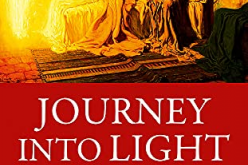Book: The Spirit of Catholicism by Vivian Boland OP

The Spirit of Catholicism, Vivian Boland OP. Published by Bloomsbury, 2021, £16.99
Apart from the United Nations, the Roman Catholic Church is probably the largest organization on the planet. It is multi-cultural, multi-lingual, multi-racial and extended throughout the planet. It has preached its message to all of humanity. Its organization involves, somehow, every one of its 1.2 billion adherents. Its central government is among the strongest ever known in human history. The allegiance and loyalty it attracts is almost beyond belief.
Vivian Boland, Dominican friar and professor of Theology at the Angelicum University of Rome, has written this book at a moment of crisis in the Roman Church. Scandals of sexual and financial nature have disfigured it; political, cultural and theological differences have divided it. Modern society no longer does God. Many of God's representatives are out of touch, exhausted, decreasing in numbers and out of step with the younger generation.
Boland's book, as pointed out in his Introduction, is one in a long line of writings on the Church in culture, history and society. The author recalls John Henry Newman's, An Essay on the Development of Christian Doctrine. He points to Karl Adam's, The Spirit of Catholicism. Henri de Lubac wrote, Catholicism: Christ and the Common Destiny of Man (1938). Romano Guardini wrote several essays from the midst of the gloom and despair of World War II.
These authors were quite sensitized to the currents and trends of their time and place. Vivian Boland offers a new reflection on the Catholic thing, rooted in the Tradition. He wants to state once again the wealth of intellect, spirit, imagination and creativity which still characterise the Catholic Church even today.
The book is neither apologetic nor controversial. Boland seeks to state once again what is at the heart of Catholicism. He makes use of the latest biblical scholarship. He dips deeply into the Church's spiritual riches. And he makes use of the multi-storeyed theological edifice built up from the early centuries.
The spirit Vivian Boland points to is the fact that it is an embodied spirit. Since the coming of Jesus of Nazareth, human and divine, the Church has been immersed in earthly realities and in human concerns. Under the leadership of Pope Francis, for example, the Church continues to reach out to the poor and afflicted, to criticise those structures and organisations which obstruct the growth of the human being, and has now embraced the planet and its life-systems as central to its evangelical mission.
The Church talks about itself through many different images and metaphors. Boland emphasises three: people of God, kingdom and body of Christ.
The image of People of God was the one preferred by the Bishops at Vatican II. They put the faithful on an equal footing with the clergy, as though in a concentric circle instead of a pyramid. The late Jeremiah Newman, Bishop of Limerick during the 1970s, explained Vatican II's preference for the image of People of God by saying that "everybody in the diocese is equal, from me down." Some chuckled sardonically. Others frowned at a hierarch always a hierarch.
The image of kingdom recalls the centrality of Kingdom of God in the preaching and practice of Jesus. He spoke of it as a coming reign of peace with justice and holiness. He also said that the kingdom was among his followers and also in the invisible depths of each one where the deep of oneself spoke to the Deep mysteriously inhabiting each one. The image of body of Christ points to our Christian anthropology. We are one in the resurrected Christ as we overcome our divided selves and recognise the cross of Christ a shared burden and a shared joy.
Boland dedicates a chapter (5) to the forms of corruption in our corporate body. We are carriers of death as well as of resurrection. We are no angels. Chapters 3 and 4 of Acts dedicate a few lines to describing an ideal Christian community. But by chapter 5 there are already signs of an opening fissure.
Pope Francis is very concerned about reforming the Church's structures. He has initiated a project called, 'Synodality"' whereby all the People of God are invited to voice their experiences, concerns and hopes as they journey in faith. Clericalism is a great obstacle. Francis has called it the dark side of our Church. He has also been critical of some episcopal bodies like the North American one, which has opted for a single-issue approach to its contribution to a wider political debate.
The final portion of the book is dedicated to a dense and far-reaching summing up of the Spirit of Catholicism as sacrament and practice of the Trinitarian community. That community finds its dynamic in mission for the life of the world; in the indwelling Spirit in each of us and the never-ending dance of relationship with God, with each other and with all of creation.
This is a book of great theological depth and erudition, of profound biblical insight and spiritual vitality. It is a book to renew one's Catholic feeling about identity, a book to ponder, a book to pray.
Frank Regan
December 2021


















